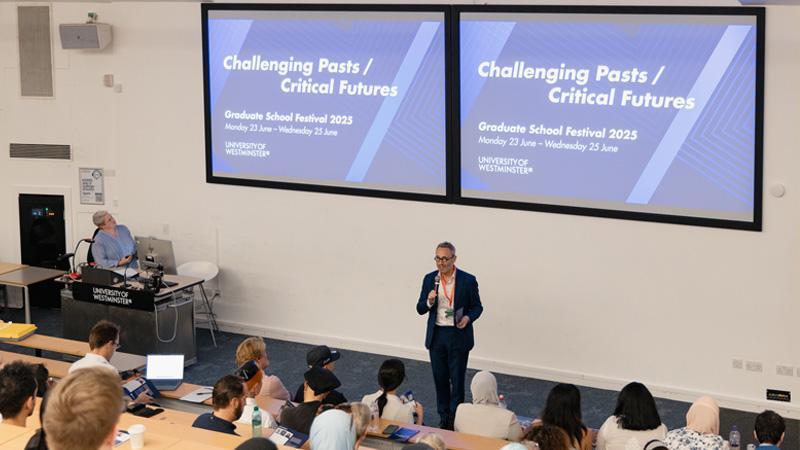The University of Westminster hosted its annual Graduate School Festival to showcase the research, creativity and ambition of its doctoral researchers. This year’s theme, Challenging Pasts, Critical Futures, focused on how research can encourage transformative change.

From 23 – 25 June, the festival considered the impacts of research through its three-day programme of talks, workshops, panel discussions and in-conversation events. Participants discussed how researchers can be empowered to question established narratives, deconstruct power relations and advocate for change by fostering critical thinking.
The festival started with a day of online events, including presentations and panels exploring different aspects of pre- and post-PhD life. An event titled Thinking of Doing a PhD? provided crucial information and advice to those thinking of embarking on a research degree. The Non-Academic Careers in Higher Education Panel focused on career options after graduation, bringing together a range of speakers who decided to pursue non-academic roles in Higher Education after completing their PhD research.
Throughout the week, doctoral researchers also had the chance to present their projects. This included Wisam Abu Ghosh with Obasanjo Okekunle, Ifigeneia Kalampouka with Khalid Akram, and Aysha Ali with Yumeng Yang. Comprising rich discussions and debates that extended across disciplines, these presentations and conversations allowed doctoral researchers to share their different perspectives, explore mutual interests and identify shared concerns.
The festival also featured an interactive workshop on the ethics of Artificial Intelligence (AI) titled Baking Equity into Conversational AI Healthcare. The workshop’s aim was to foster a shared understanding of different aspects of designing and implementing conversational AI in healthcare, focusing on equality, diversity and inclusion.
The final day of the festival saw a wide range of workshops take place led by doctoral researchers and colleagues. Victoria Burgher, a doctoral researcher in the Westminster Centre for Research and Education in Arts and Media (CREAM), led a workshop titled Crafting Change: Pinch Pots and Freedom Dreams, where participants discussed what a future free from white oppression would look like whilst making porcelain pinch pots.

Photo credit: Hedi Neijenhuis
School of Life Sciences doctoral researcher Manpreet Murjal then delivered an interactive session titled What’s Living In My Gut?, exploring the science of the human gut microbiome. Attendees also had the opportunity to engage with artifacts from the Westminster Menswear Archive (WMA) as part of a workshop led by School of Humanities doctoral researcher Thomas Chambers and WMA Curator Dr Danielle Sprecher.
Eight doctoral researchers also participated in a Three Minute Thesis (3MT) Competition, each having three minutes to communicate their research to a panel of judges accompanied only by a single slide. Hosted by Dr Naomi Paxton, this year’s judging panel consisted of Professor Dame Judith Petts, former Vice-Chancellor and Chief Executive of the University of Plymouth, Professor Debra Kelly, Emerita Professor in Modern Language and HOMELandS researcher, and Dr Margherita Sprio, Reader in Film and Visual Culture and Director of the Westminster Graduate School.

Photo credit: Hedi Neijenhuis
First-year student Laima Tokhi, who presented her research on the treatment of cardiovascular diseases, was awarded the top prize by the judges and audience. Laima will now progress to the next stage of the competition to represent the University of Westminster at the national Vitae Three Minute Thesis Competition later this year.
About winning the 3MT competition Laima said: “As a first-year PhD student, taking part in the 3MT competition at Westminster was an amazing experience! It was such a fun challenge to share my research into just three minutes and a great opportunity to share my passion with a wider audience. Winning both the People’s Choice and Judges’ Award was truly overwhelming in the best way. It reminded me why I love what I do and gave me so much motivation for the journey ahead.”
The festival concluded with a symposium hosted by Hyphen Journal, a journal led by Westminster doctoral researchers, to celebrate the launch of their newest issue, 3.2: Ecologies.
About the festival Dr Nicola Allett, Westminster Doctoral Researcher Development Manager, said: "The Graduate School Festival has been a vibrant celebration of the amazing work of our doctoral researchers, showcasing their impactful work and making connections across our research community"
The Westminster Graduate School supports several of the United Nations Sustainable Development Goals (SDGs) including SDG 4: Quality Education and 16: Peace, Justice and Strong Institutions. Since 2019, the University of Westminster has used the SDGs holistically to frame strategic decisions to help students and colleagues fulfil their potential and contribute to a more sustainable, equitable and healthier society.
Find out more about Westminster’s Graduate School and the Graduate School Festivals.


